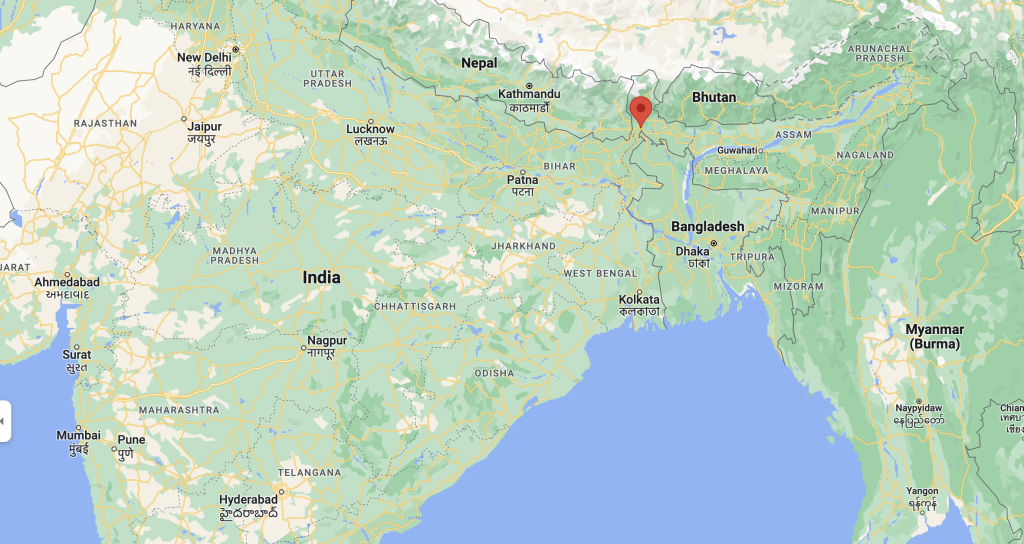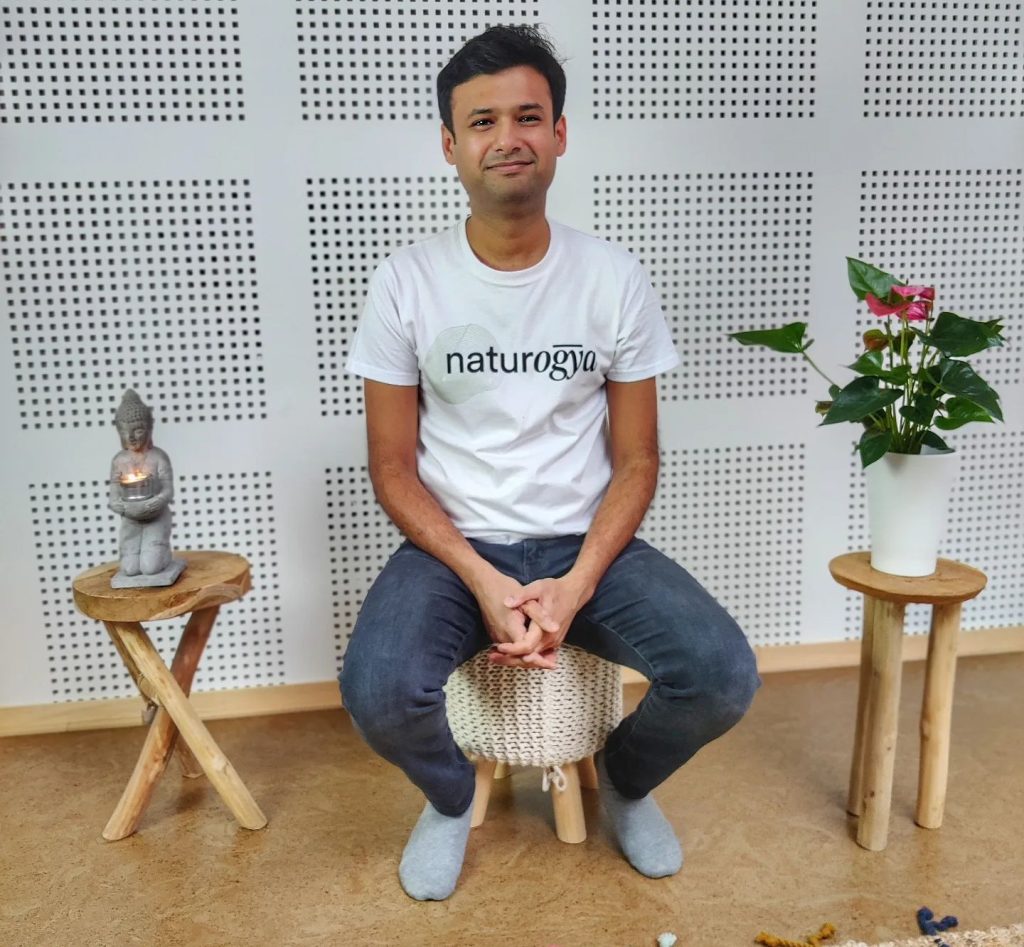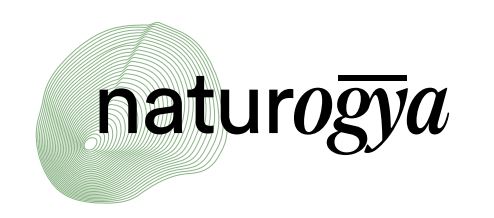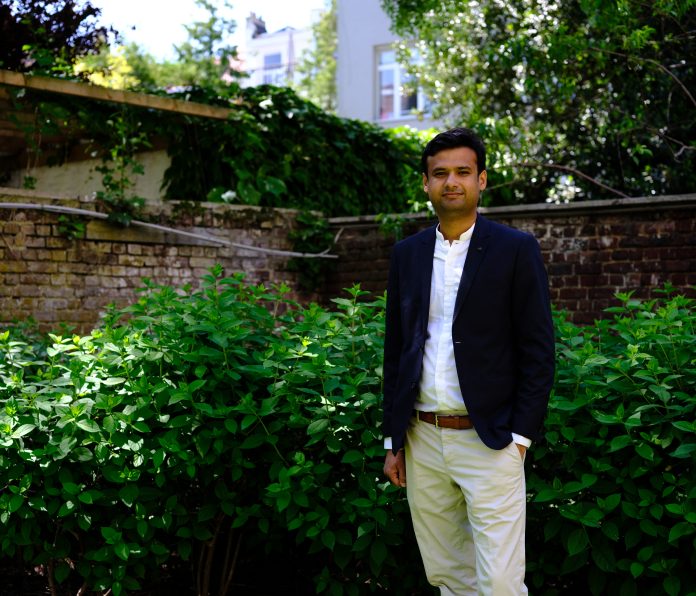Hello Harsh, welcome to the village! Tell us a little bit about where you’re from and how you came to be living in Belgium. Where is your partner from? How many children do you have?
I was born and brought up in Siliguri, in the foothills of Darjeeling (yes, the famous tea!). To give you a sense of the geography, my hometown is sandwiched between the eastern border of Nepal and the western border of Bhutan. It was a lovely place to grow up.

I moved to London for my master’s degree and after spending a few years in the corporate world as an economist, I decided it wasn’t for me. My wife, who is French, works with the European institutions and we wanted to have a family, so we decided to move to Brussels.
We have a 14-month-old, so I divide my time between running my nutrition practice, taking care of my child, and pursuing my other passion as a concert promoter (organising experimental music shows in Brussels).
You recently started Naturogya, where you help people enhance their overall well-being through naturopathic nutrition. For those who are not familiar with naturopathy, can you explain more about this approach to health and well-being?
Naturopathy is a holistic approach to wellness. It’s based on the belief that there are a number of environmental factors that are important for good health, for example, a healthy diet, exercise, access to clean water and air, and stress management.
If any of these factors are missing, or there’s an imbalance, then your body falls out of harmony with the environment. And that’s where illness sets in.
Naturopathy looks to re-establish this balance through various tools like nutrition, herbal medicine, reflexology, aromatherapy, and homeopathy, to name a few.
Naturogya looks at the nutrition aspect.
“One of the beauties of naturopathic nutrition is that there is no rigid set of rules – everyone is treated according to their own personal circumstances and biological makeup.”
What is special and different about a naturopathic approach to nutrition?
I think we all know that proper nutrition is important for well-being. However, there is a skewed perception of what nutrition means. It is usually perceived as what we eat and how that satisfies our nutritional needs.
But it’s not only about what we eat. It’s also how we prepare and eat the food, as well as when it’s appropriate to eat certain food and when not. We also know that stress impacts our health, so looking at how diet can mitigate the impact of stress is another important aspect. Elimination of toxins is another topic that does not get enough attention.
One of the beauties of naturopathic nutrition is that there is no rigid set of rules – everyone is treated according to their own personal circumstances and biological makeup. For example, a particular food may be beneficial for one person but less so for someone else.

Where did your own interest in nutrition come from?
Growing up in India, nutrition was always something that my family focused on, but the knowledge that my parents had was not due to some training, but indigenous knowledge passed through generations.
They might not have been aware of the mechanisms behind certain practices, but they knew that they worked.
When I decided to change career, I knew I needed to feel a sense of purpose – and also be my own boss. I was drawn to the idea of formalising the knowledge of nutrition that I had gained during my upbringing, so I trained as a Naturopathic Nutritional Therapist at the Natural Healthcare College in the United Kingdom.
How would you describe your approach?
My approach starts from the principles of naturopathic nutrition (some of which I have described above), and is always adapted to an individual’s personal circumstances.
One of the biggest challenges for any practitioner is when an individual can’t stick to a programme. If my approach isn’t sustainable for them, they are unlikely to see any benefits. For example, there is no point in me recommending freshly cooked meals to someone who works 12-hour days.
So a lot of my work revolves around understanding my clients’ daily lives and their motivations – the psycho-social aspect of my work – and adjusting my advice accordingly. As a nutritional consultant, it’s my role to make recommendations that are implementable.
“A slow pace of change in diet and lifestyle habits gives you a better chance of achieving long-term overall well-being.”
A good personal yardstick for assessing my approach is whether my clients come back to me – and they usually do not (although the sample size is still small). It is normal for clients to be motivated during and in between sessions, but the really important bit is that they should feel empowered to take good decisions about their health after they stop having sessions with me.
This is something I put great emphasis on.
One of the programmes you offer is specifically for the post-natal period. Why did you decide to offer this?
The process of giving birth is one of the most intense human experiences you can imagine. And when the body goes through high-stress experiences, it uses a lot of nutrients to deal with that stress. There can also be a lot of physical and psychological stress on the mother during the birth process.
It’s therefore not hard to imagine that a mother is severely depleted and exhausted from giving birth.
Many cultures, in particular Eastern cultures, recognise this and have rituals and customs that support the mother’s recovery in the period after birth. These typically include a special diet but also involve creating an environment where the mother can relax and feel loved.
Things are a little different here in the West.
First of all, there isn’t nearly enough support for women postnatally as there is in the prenatal period. Secondly, community support is either non-existent or insufficient. The mother’s partner is often back at work 2-3 weeks after birth, leaving the mother alone at home with her baby, and therefore subject to additional stress.
The result? Mothers feel exhausted, sometimes months or even years after giving birth. And this gets normalised because all other mothers are feeling the same way.
My goal is to ‘de-normalise’ this postnatal experience and offer a naturopathic way that could help mothers recover adequately. The first three months after birth are crucial, and it’s important to recognise that during this time, a mother’s dietary needs to support her recovery are very different from her everyday diet.
“My job is to help people understand that we should not forget about mothers, whose health is crucial not only so she can take care of her child, but also in and of itself.”
How does your programme support a mother’s recovery?
The programme is organised in two parts:
1. The pre-natal period (from 2-3 months before birth)
In these sessions, I try to get a sense of the mother’s health history (since this has an impact on the degree of symptoms she may face after birth) and address any existing issues.
I then try to build a tailored diet and lifestyle framework for after birth. The idea is to give the parents enough time to prepare because once the baby is born, it becomes harder to re-focus on the mother’s health.
2. The post-natal period (for 3 months after birth)
In these sessions, I am essentially following the progress of the mother and supporting her in her dietary needs.
There may be things that are not working from a practical perspective, or I may need to make certain adjustments depending on her recovery.
Finally, I chart a path back to a normal diet and lifestyle which should be adopted gradually.
Because new mothers may not have much community or family support in the weeks and months after the birth, the support of the partner (where relevant) becomes crucial. My programme takes into account this very important point and is tailored according to the circumstances of every family.

Can it be difficult even to convince expectant mums themselves of the value in preparing their post-natal recovery?
The tendency after birth is indeed to completely focus on the child. And for good reason. My job is to help people understand that we should not forget about new mothers, whose health is crucial not only so she can take care of her child, but also in and of itself.
So yes, a lot of my work involves educating mothers about the need for proper post-natal recovery.
And because this programme aims to prevent the kind of depletion and exhaustion new mothers often experience, it can sometimes be difficult for someone to assess how beneficial it is for them – as is the case for any preventative therapy.
Mothers who have worked with me tend to report that they appear to be in better health than their peers. But of course, it requires a certain amount of faith in my narrative and the scientific principles of the programme.
These days, many of us want fast results when we feel something is ‘broken’. You, however, seem to recommend a slower, and less drastic approach. Why do you find that works better?
The online world is full of practitioners who promise to revolutionise, and ‘fix’ your life through byte-sized drastic changes. I understand the attraction to that. No one ever tells you that you need a holistic, 360° approach because that’s boring and time consuming.
But slow progress works for one simple reason: it is not sustainable to bring about fast change.
To give an analogy – an airplane can only land safely if it reduces its altitude slowly. It’s the same principle with our health – the body is not used to rapid adjustments.

Also, from a behavioural standpoint, we are creatures of habit. At certain points in our life we may feel motivated to bring about drastic changes to these habits, but it is much more difficult to sustain them in the long run. The result is that we keep oscillating between good and bad habits.
So I ask people: how about bringing about change at a pace that doesn’t feel like a burden?
If we think about it, bringing about slow change in our lives isn’t exactly a new idea. We build careers slowly, we build trusting relationships slowly, we educate ourselves slowly – think about how many years we need to study before we are ready to be gainfully employed? Why should it be any different for our health?
Going back to the airplane analogy, a slow pace of change in diet and lifestyle habits gives you a softer landing and a better chance of achieving long-term overall well-being.
What changes to your own nutrition and lifestyle have made the biggest overall impact to your wellbeing?
I think it’s hard to pinpoint any specific aspect. My belief in holistic wellness has usually meant keeping various aspects of my health and lifestyle in mind. And as time goes on, these have become so instinctive that it doesn’t feel like an effort anymore.
This sense of being on (a well-calibrated) autopilot is what I try to achieve with my clients. And in the urban context, where we have extremely busy and stressful lives, this is really important.
If you had to give one piece of advice for those who want to take a more holistic approach to their own well-being, what would you recommend?
To be honest, I’m generally not in favour of providing generic advice. So much depends on the individual – their health history, body constitution, preferences etc. Of course, there are some ideas that are generally good for everyone, such as having a varied diet.
But when I’m working one-to-one, my advice to one person will always be different to the advice I give to another.
It’s an interesting question, actually, because it shows how people often like to think about nutrition. It’s easier (and maybe less scary) to pick up some tips and tricks rather than taking the time to examine our diets and lifestyle and commit to longer-term action.
Harsh Agarwal is a Brussels-based, UK-trained naturopathic nutritional consultant. Through Naturogya, he offers individual counselling as well as coaching programmes, including the Post-Natal Nutrition Programme.
Follow Naturogya on Instagram, Facebook, or reach out to Harsh to find out more:
harsh@naturogya.com
(+32) 471 650916






